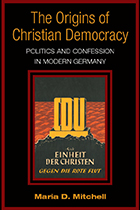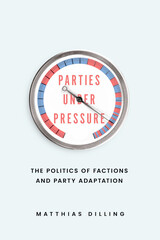
This book is a pioneering contribution to the history of the founding of the West German political system after the Second World War. The political cooperation between Catholics and Protestants that resulted in the formation of the Christian Democratic Union (CDU) in occupied and early West Germany represented a significant change from a long history of hostility in confessional relations. Given that the CDU went on to dominate politics in West Germany well into the 1960s, Maria D. Mitchell argues that an understanding of what made this interconfessional party possible is crucial to an exploration of German history in the postwar period. She examines the political history of party formation as well as the religious beliefs and motivations that shaped the party's philosophy and positions. She provides an authoritative guide to the complex processes of maneuvering and negotiation that produced the CDU during 1945-46. The full range of political possibilities is discussed, including the suppressed alternatives to the Adenauer/Erhard axis that eventually defined the party's trajectory during the 1950s and the abortive Christian Socialism associated with Jacob Kaiser.

An illuminating investigation into why some parties evolve with their times while others fall behind.
Around the world, established political parties face mounting pressures: insurgents on the Left and Right, altered media environments, new policy challenges, and the erosion of traditional strongholds, to name just a few. Yet parties have differed enormously in their ability to move with the times and update their offers to voters. This variation matters. While adaptation does not guarantee a party’s electoral success, the failure to modernize can spell its decline, even collapse, and create openings for radical and populist parties that may threaten the future of liberal democracy.
Parties under Pressure examines why some parties adapt meaningfully to social, economic, and political transformations while others flounder, focusing especially on the fate of Western Europe’s Christian democratic parties. Matthias Dilling reveals the under-appreciated importance of party factions. While very high levels of factionalism are counter-productive and create paralysis, more moderate levels of factionalism help parties to adapt by giving visibility to fresh groups and ideas. Dilling draws on extensive archival research in Germany, Italy, and Austria, as well as evidence from France, Japan, and beyond. Taking a comparative-historical approach, Parties under Pressure sheds new light on parties’ varying records of adaptive reforms over more than seventy-five years.

From the time of Bismarck’s great rival Ludwig Windthorst to that of the first post–World War II Chancellor, Konrad Adenauer, the Catholic community in Germany took a distinctive historical path. Although it was by no means free of authoritarian components, it was at times the most democratic pathway taken by organized political Catholicism anywhere in Europe.
Challenging those who seek continuity in German history primarily in terms of its long march toward Nazism, Noel Cary crosses all the usual historical turning points from mid-nineteenth- to late-twentieth-century German history in search of the indigenous origins of postwar German democracy. Complementing recent studies of German Social Democracy, it links the postwar party system to the partisan traditions this new system transcended by documenting the attempts by reform-minded members of the old Catholic Center party to break out of the constraints of minority-group politics and form a democratic political party. The failure of those efforts before 1933 helped clear the way for Nazism, but their success after 1945 in founding the interdenominational Christian Democratic Union (CDU) helped tame political conservatism and allowed the emergence of the most stable democracy in contemporary Europe. Integrating those who needed to be integrated—the cultural and political conservatives—into a durable liberal order, this conservative yet democratic and interdenominational “catch-all” party broadened democratic sensibilities and softened the effect of religious tensions on the German polity and party system.
By crossing traditional chronological divides and exploring the links between earlier abortive Catholic initiatives and the range of competing postwar visions of the new party system, this book moves Catholic Germany from the periphery to the heart of the issue of continuity in modern German history.
READERS
Browse our collection.
PUBLISHERS
See BiblioVault's publisher services.
STUDENT SERVICES
Files for college accessibility offices.
UChicago Accessibility Resources
home | accessibility | search | about | contact us
BiblioVault ® 2001 - 2024
The University of Chicago Press









